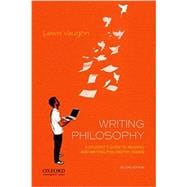Writing Philosophy: A Student's Guide to Reading and Writing Philosophy Essays, Second Edition, is a concise, self-guided manual that covers how to read philosophy and the basics of argumentative essay writing. It encourages students to master fundamental skills quickly--with minimal instructor input--and provides step-by-step instructions for each phase of the writing process, from formulating a thesis, to creating an outline, to writing a final draft, supplementing this tutorial approach with model essays, outlines, introductions, and conclusions.
Writing Philosophy is just $5 when packaged with any Oxford University Press Philosophy text. Contact your Oxford representative for details and package ISBNs.








